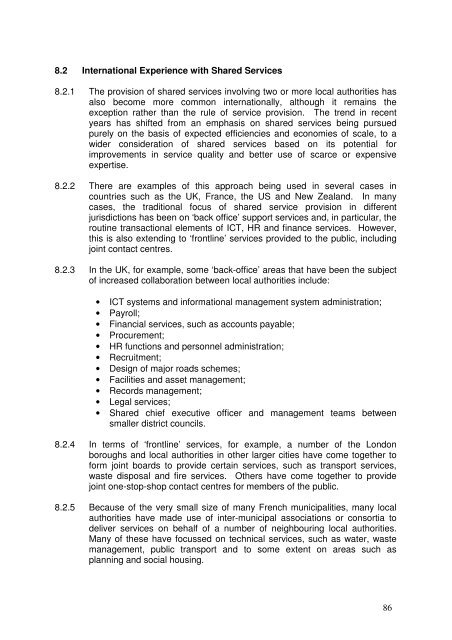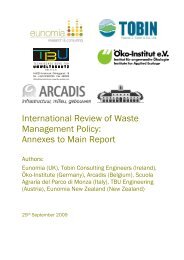Report of the Local Government Efficiency Review Group
Report of the Local Government Efficiency Review Group
Report of the Local Government Efficiency Review Group
You also want an ePaper? Increase the reach of your titles
YUMPU automatically turns print PDFs into web optimized ePapers that Google loves.
8.2 International Experience with Shared Services<br />
8.2.1 The provision <strong>of</strong> shared services involving two or more local authorities has<br />
also become more common internationally, although it remains <strong>the</strong><br />
exception ra<strong>the</strong>r than <strong>the</strong> rule <strong>of</strong> service provision. The trend in recent<br />
years has shifted from an emphasis on shared services being pursued<br />
purely on <strong>the</strong> basis <strong>of</strong> expected efficiencies and economies <strong>of</strong> scale, to a<br />
wider consideration <strong>of</strong> shared services based on its potential for<br />
improvements in service quality and better use <strong>of</strong> scarce or expensive<br />
expertise.<br />
8.2.2 There are examples <strong>of</strong> this approach being used in several cases in<br />
countries such as <strong>the</strong> UK, France, <strong>the</strong> US and New Zealand. In many<br />
cases, <strong>the</strong> traditional focus <strong>of</strong> shared service provision in different<br />
jurisdictions has been on ‘back <strong>of</strong>fice’ support services and, in particular, <strong>the</strong><br />
routine transactional elements <strong>of</strong> ICT, HR and finance services. However,<br />
this is also extending to ‘frontline’ services provided to <strong>the</strong> public, including<br />
joint contact centres.<br />
8.2.3 In <strong>the</strong> UK, for example, some ‘back-<strong>of</strong>fice’ areas that have been <strong>the</strong> subject<br />
<strong>of</strong> increased collaboration between local authorities include:<br />
• ICT systems and informational management system administration;<br />
• Payroll;<br />
• Financial services, such as accounts payable;<br />
• Procurement;<br />
• HR functions and personnel administration;<br />
• Recruitment;<br />
• Design <strong>of</strong> major roads schemes;<br />
• Facilities and asset management;<br />
• Records management;<br />
• Legal services;<br />
• Shared chief executive <strong>of</strong>ficer and management teams between<br />
smaller district councils.<br />
8.2.4 In terms <strong>of</strong> ‘frontline’ services, for example, a number <strong>of</strong> <strong>the</strong> London<br />
boroughs and local authorities in o<strong>the</strong>r larger cities have come toge<strong>the</strong>r to<br />
form joint boards to provide certain services, such as transport services,<br />
waste disposal and fire services. O<strong>the</strong>rs have come toge<strong>the</strong>r to provide<br />
joint one-stop-shop contact centres for members <strong>of</strong> <strong>the</strong> public.<br />
8.2.5 Because <strong>of</strong> <strong>the</strong> very small size <strong>of</strong> many French municipalities, many local<br />
authorities have made use <strong>of</strong> inter-municipal associations or consortia to<br />
deliver services on behalf <strong>of</strong> a number <strong>of</strong> neighbouring local authorities.<br />
Many <strong>of</strong> <strong>the</strong>se have focussed on technical services, such as water, waste<br />
management, public transport and to some extent on areas such as<br />
planning and social housing.<br />
86
















